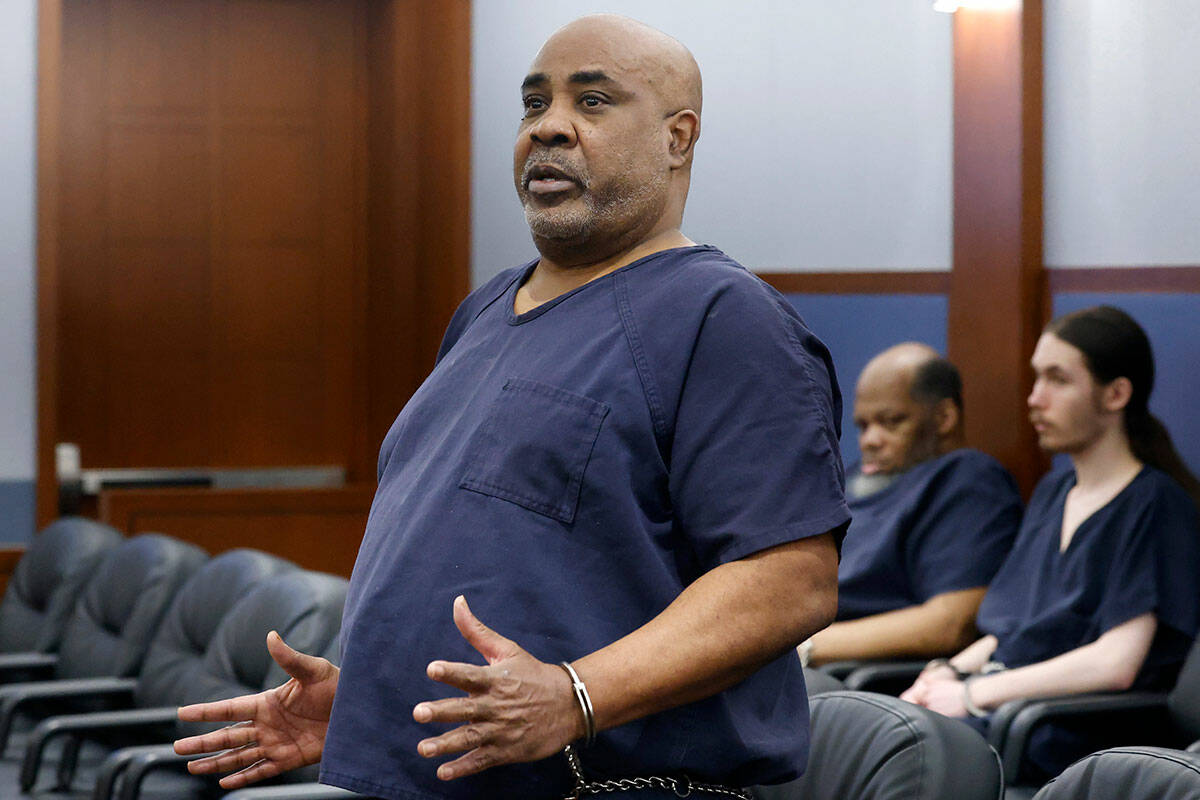Prosecutors: Tupac Shakur slaying suspect not protected by an immunity agreement

Prosecutors are arguing that Duane “Keffe D” Davis, the man accused of orchestrating the murder of hip-hop icon Tupac Shakur, has no agreement protecting him from prosecution in Nevada.
Davis, 61, filed a motion earlier this month asking a judge to dismiss the murder charge he faces in connection with Shakur’s 1996 death in a drive-by shooting near the Strip. Davis’ attorney, Carl Arnold, wrote that prosecutors had delayed pursuing charges against Davis and were violating an agreement that reportedly gave Davis immunity from prosecution.
Prosecutors on Wednesday filed a 23-page response arguing that Davis has provided “absolutely no proof” that he received immunity from a prosecuting authority and that in Nevada only a court order could protect him from prosecution.
The document stated that retired Metropolitan Police Department detective Clifford Mogg was assigned to re-investigate the murder after Davis made public statements in interviews posted to YouTube following the release of a cowritten book, in which he described his alleged role in Shakur’s killing. Prosecutors have said that Davis, the reported leader of the South Side Crips, ordered the killing in response to a fight involving his nephew Orlando Anderson, Shakur and Death Row Records CEO Marion “Suge” Knight.
“In the years following Shakur’s murder, Defendant, Duane ‘Keffe D’ Davis, confessed to being involved in Shakur’s murder in nearly every form imaginable,” prosecutors wrote in Wednesday’s response.
The shooting was allegedly part of an ongoing feud between the South Side Crips, who were associated with the Bad Boy Records label owned by Sean “Diddy” Combs, and the Bloods-associated Mob Piru Gang, who were also tied to Death Row Records.
Defense attorneys have previously pointed to a 2008 “proffer agreement” that supposedly protected Davis from prosecution. The agreement was between Davis and federal agents investigating the murder of Christopher “Biggie” Wallace, who was represented by Bad Boy Records when he was killed less than a year after Shakur was fatally shot.
According to Wednesday’s response, Mogg spoke with the U.S. attorney who reached the agreement with Davis in 2008. The attorney was unable to produce record of the actual agreement but provided the detective with a copy of a standard proffer letter he gave to defendants, which states that the agreement only concerns information given in a single conversation and does not bind any other law enforcement agency or prosecuting authority.
Prosecutors wrote that during the initial interview, Davis said he knew nothing about Wallace’s killing, but “alluded to knowing who killed Tupac Shakur,” according to court documents. Two detectives with the Los Angeles Police Department met with Davis later that month, while “not being aware of the specific terms” of the agreement, according to the response.
In later meetings with the detectives, Davis confessed to his involvement in Shakur’s killing and agreed to be a confidential informant for the Los Angeles Police Department, prosecutors wrote.
Davis’ attorney has previously said that Las Vegas police knew much of this information from a 2009 interview between Davis and a Metropolitan Police Department detective. But prosecutors argued that during the 2009 interview, Davis did not provide as many details as were included in his book and YouTube interviews.
In the motion earlier this month, Davis’ attorney also pointed to a 1998 interview Davis gave to an assistant U.S. attorney after Davis was arrested for cocaine distribution. That interview was also covered by a proffer agreement, Arnold wrote. Davis denied knowing who shot Shakur during that interview and instead claimed Compton police were involved in the killing, “under direction of Mr. Suge Knight,” the motion said.
“The State does not seek to utilize the 1998 ‘proffer session,’ against Defendant and has no idea what the terms of such an agreement were between him and the federal government before he entered his plea,” prosecutors wrote.
Prosecutors argued that they did not delay in charging Davis because the renewed investigation into Shakur’s killing was sparked by his public statements in recent years. Davis’ motion from earlier this month also failed to establish that prosecutors intentionally delayed the charges, according to Wednesday’s response.
A judge is set to hear arguments over the issue during a hearing on Tuesday.
Contact Katelyn Newberg at knewberg@reviewjournal.com or 702-383-0240.